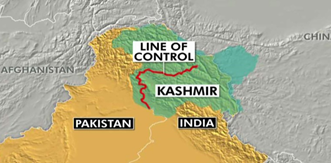

6th February 2023 (7 Topics)
Context
Pakistan’s former President General Pervez Musharraf visited India at Agra Summit held in 2001 during the Atal Bihari Vajpayee government, was considered one of the most important meetings between Indian and Pakistani leaders in recent history.
Background
- Musharraf travelled to Agra for the summit with Prime Minister Atal Bihari Vajpayee.
- There was some forward movement on the first day.
- At a 90-minute one-on-one session, the two leaders discussed the Kashmir issue, cross-border terrorism, nuclear risk reduction, the release of prisoners of war, and commercial ties.
- Musharraf proposed a “four-point solution” for the Kashmir dispute.
- Recently, it has been reported that, he died in Dubai.

What was the Four-point formula for Kashmir issue?
- Demilitarisation or phased withdrawal of troops:
- Millions of troops, on both sides of the Line of Control (LoC), are stationed in Kashmir.
- According to Musharraf, both India and Pakistan would have scaled back its troops in the region for a lasting peace.
- Whether this would be gradual, phased withdrawal or not had to be worked out by the two sides.
- There will be no change of borders of Kashmir: However, people of Jammu & Kashmir will be allowed to move freely across the Line of Control (LoC).
- The LoC is effectively a ceasefire line, which both sides accepted in the Shimla Agreement of 1972.
- However, neither India nor Pakistan accepts it as the International Border. Both nations claim all of Kashmir.
- If Musharraf’s plan were to be accepted, India would have to accept Pakistan’s sovereignty over Pakistan Occupied Kashmir (which Pakistan refers to as its province of Azad Kashmir) and in return, Pakistan would accept Indian suzerainty over the part of Jammu and Kashmir on India’s side of the LoC.
- The ceasefire line would then become the International Border and both sides would give up claims over the other half of Kashmir.
- However, the people of Jammu and Kashmir would be allowed to move freely to the other half of the region.
- Self-governance without independence:
- Pakistan has long been an advocate of what it calls ‘Kashmiri self-determination’ but Musharraf was willing to give that up in favour of a greater measure of autonomy.
- Vajpayee would likely not have too many objections with this clause of the agreement because the Indian Constitution already allows autonomy for J&K under Article 370.
- A joint supervision mechanism in Jammu and Kashmir involving India, Pakistan and Kashmir:
- Musharraf’s decision to include local Kashmiri leadership in the supervision mechanism would have given him a greater chance at selling a potential Musharraf-Vajpayee accord to the people back home in Pakistan.
India’s response to the idea:
- There aroused certain differences to 4 point formula on part of India.
- India Prime Minister Manmohan Singh, however, excluded any consideration of such proposals by emphasizing that the state of Jammu and Kashmir is an integral part of India and there would be no redrawing of the international boundaries or rearrangement of regions that would blow of communal dimensions.
- The Indian claim over the whole area of Jammu and Kashmir, including Pakistani administered Kashmir, was repeated in March 2006 by the Indian government s official protest over the proposed construction of the Bhasha dam in the territory which comes under the Pakistani controlled part of Kashmir.
- The doctrine of open borders or soft borders was explained by Manmohan Singh as” making LoC a porous border so that there could be free flow of ideas and people between the two parts of Kashmir which will, according to him, one day make LoC irrelevant.”
- Demilitarization is also not agreeable for India because they consider it as their domestic security related issue.
- Apart from differences over demilitarization, major obstacle in making LoC beside the point is that India considers this decision should be the eventual solution of the Kashmir dispute whereas Pakistan considers this as one of the very important confidence-building measure.
- Accepting LoC as ultimate solution to the issue means Pakistan completely gives up its case on Kashmir.
More Articles


